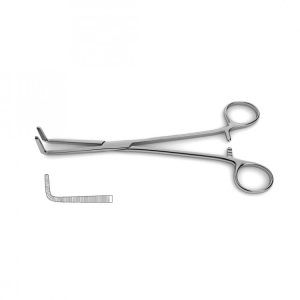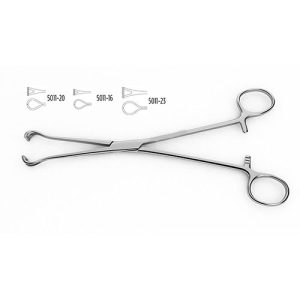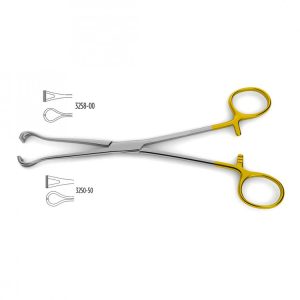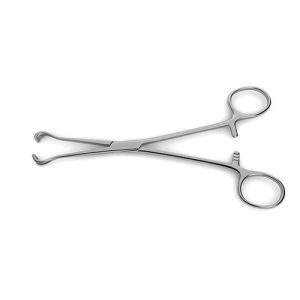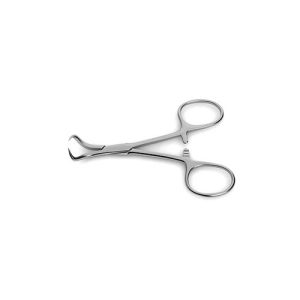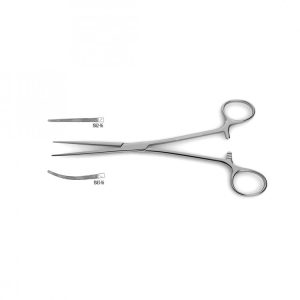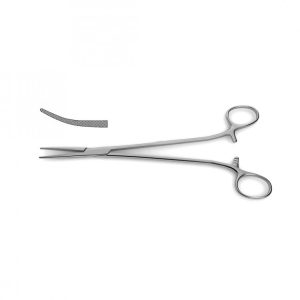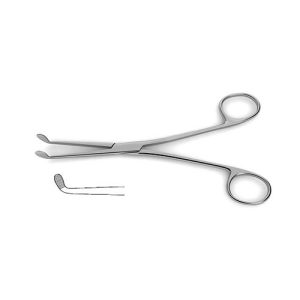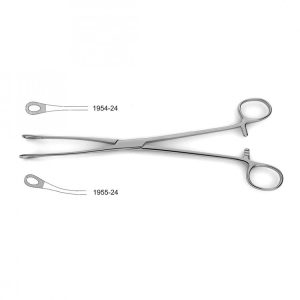Forceps & Clamps
Artery & Intestinal Forceps
Longitudinal serrations, 1x2 teeth, straight
Allen-Kocher Artery and Intestinal Forceps are designed with longitudinal serrations on straight jaws. These ratchet ring-handled forceps also contain 1x2 teeth on the tips of the jaws that interlock in order to compress tissue in which blood is being depleted.
Artery Forceps
Artery Forceps
right angle, 8" (20.0 cm)
Wilkstroem Artery Forceps have serrated jaws that are curved at a right angle. In order to obtain hard to reach arteries, this forceps helps to clamp off any future bleeding that may result. This instrument is also polished to a dull, satin finish to reduce glare under operating room lights.
Babcock Intestinal Forceps
Jaws w/ atraumatic parallel serrations
Babcock Intestinal Forceps have jaws with atraumatic parallel serrations that are intended to hold a shorter section of intestine with minimal trauma and constriction. There is a ratchet on the inner side of the ring-handles so that the forceps can lock in place when needed during a surgical procedure. The forceps are polished to a dull, satin finish to minimize glare below operating room lights.
Babcock Tissue Forceps
Babcock Tissue Forceps
standard pattern.
Babcock Tissue Forceps come in a standard pattern with semicircular rounded tips to allow for holding or grasping delicate body structures. These forceps are crafted from premium German operating-room grade stainless steel and are available in a wide variety of lengths.
Babcock Tissue Forceps – Tungsten Carbide
Tungsten carbide jaws
Babcock Tissue Forceps have jaws that are made from tungsten carbide, the hardest metal made for surgical instruments. Precision-milled serrations are formed onto the tungsten carbide inserts, resulting in pyramid-shaped teeth that provide a non-slip grip. Pyramid-shaped teeth align perfectly with each other to provide a durable and reliable grasp of the most delicate or toughest tissues, as well as needles, sutures, dressing materials and delicate vessels. Smooth tungsten carbide inserts are also available for delicate procedures. Spring tension allows for surgeons to maintain proper and consistent position, ensuring optimal grip without having to apply excess force. These forceps also feature gold-plated handles.
Babcock-Baby Tissue Forceps
Babcock-Baby Tissue Forceps
extra-delicate jaws.
Babcock-Baby Tissue Forceps contain extra-delicate jaws that can be used to grasp delicate tissues or structures like the ovaries. The forceps generally have smaller jaw width and shorter overall length than the standard pattern. The shorter length may provide better control or ability to work closer to the body.
Backhaus (Ball & Socket) Towel Clamp
Backhaus (Ball & Socket) Towel Clamp
5-1/8" (13.0 cm
Backhaus (Ball and Socket) Towel Clamp has the primary use of securing drapes to the surgical site to prevent any changes in their position during an operation. The ball and socket on the tips of the inwardly curved jaws help to secure the drapes while minimizing the penetration and damage. To use this clamp, it is positioned to the desired place and then closed using the ring-handles. The ratchet allows this instrument to stay secure until it is released.
Backhaus Towel Clamp
Backhaus Towel Clamp
Backhaus Towel Clamp is mainly used to fasten drapes or towels to patients during medical procedures in order for them to stay on. The pointed tips of the jaws cave inward so that they enter both the skin and drape. This clamp is designed with ring-handles and ratchet fixation to allow the clamp to remain in place until it is released.
Bainbridge Artery & Intestinal Forceps
Bainbridge Artery & Intestinal Forceps
standard pattern.
Bainbridge Artery and Intestinal Forceps come in a standard pattern and may be used in medical procedures such as when a bowel needs to be clamped. These forceps have long, slightly tapered jaws with longitudinal serrations that are presented in a curved or straight pattern in different overall lengths.
Bengolea Forceps
Bengolea Forceps
8-1/2" (21.6 cm)
Bengolea Forceps are used as a hemostatic agent to grip the ends of vessels and regulate the bleeding. This forceps can be adapted to be used for general surgical procedures if hemorrhaging occurs. Another feature of this instrument is the arrangement of the straight and cross-serrated jaws that are able to provide a sure grip.
Benson Pyloric Stenosis Spreader
Benson Pyloric Stenosis Spreader
6" (15.0 cm)
Benson Pyloric Stenosis Spreader is a 6" slim ring-handled instrument with jaws that have serrations on the bulb-shaped, angled tips. The style of this spreader allows it to easily enter into an incision in procedures such as a myotomy. The serrations and bulb-shaped tips are used to force open the two muscle halves and keep it from sliding while the rest of the operation continues.
Bergmann-Foerster Sponge Forceps
Bergmann-Foerster Sponge Forceps
small loop jaws, serrated, 9-1/2" (24.0 cm)
Bergmann-Foerster Sponge Forceps are specifically designed to hold sponges or swabs during a wide array of surgical procedures. Due to the serrated and small looped jaw ends, these ring-handled forceps do not cause much trauma to the patient while tissue is being held or moved around. Especially in gynecological procedures, the curved jaws of the forceps are more useful than the straight style because they may assist to keep certain parts, such as the uterus, in place.


